Lecture 10 Verb and Verb phrases(课上用)
Lecture10词语搭配、语法形式与翻译

注:关键搭配——application of …
2) Challenges being addressed by modern environmental biotechnology range from the search for microbes that will reduce acid rain by removing sulfur from power coal to the biological production of biodegradable plastics.
长期咳嗽或嗓音嘶哑可能是肺癌或喉癌 的征兆。
3) There are a number of websites that can help you calculate your carbon footprint, or the quantity of carbon dioxide (greenhouse gas) that is produced by your choices of food, heating, travel, and other activities.
Hale Waihona Puke 1) A significant portion of the human population nowadays suffers from arthritis or inflammation of the joints.
目前相当一局部人群患有关节炎。
2) A persistent cough or hoarseness may indicate either lung cancer or cancer of the throat, known as laryngeal cancer.
Lecture 10 Verb and Verb Phrase 英语语法教学课件

Classification of verbs ( I )
1) Main verbs and auxiliaries
•a) Primary auxiliaries
be, do, have
Auxiliary be, is usually used to help the main verb to form the progressive aspect or the passive voice.
The fish is fresh from water. You don’ห้องสมุดไป่ตู้ have to smell it. The milk is going bad. It smells. This dish smells delicious.
Classification of verbs ( I )
3) Dynamic verbs and stative verbs
Classification of verbs ( I )
2) Transitive verbs, intransitive verbs and linking verbs
b) Intransitive verbs •Intransitive verbs do not require an object:
This rule applies to ( = is applicable to) everyone. French differs from ( = is different from) English in having gender for all nouns. The auditorium holds ( =has the capacity for) 2000 people
华南师范大学英语专业大二语法课8-Verbs(1)

Verbs
Part One FINITE VERB PHRASES I. Main Verbs (Full Verbs )
1. transitive, intransitive and linking verbs 2. regular and irregular verbs 3. dynamic and stative verbs 4. compound verbs
student.) • I have a ticket. (* I am having a
ticket)
Progressive aspect for be:
• Tom isBiblioteka being foolish.(= is talking or acting foolishly now)
• The children are being quiet. (= are playing quietly now)
• 4 types of time: present, past, future, past future
• 4 aspects: zero aspect (simple), continuous, perfect,
continuous perfect
• Number of Tenses = 4 x 4 = 16 (tenses)
link. v. + n.: • The actor looked his part. • He died a heroic death.
link. v. + adv.: • They kept together in the struggle. • The girl flushed up at the words.
Lecture_3动词的时和体
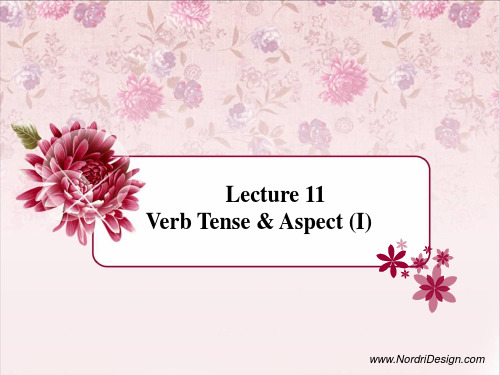
Three sub clauses:
I hope… I bet… see to it… make sure… make certain… if / when… I hope you have a good time. = I hope you will have a good time. I’ll make sure you don’t get lost. =…you won’t get lost. If it is fine tomorrow, we will go to the countryside
Alice tells me you’re entering college next year. I hear poor old Mrs. Smith has lost her son.
tell, say, hear, learn, write
b. Historic Present: as a device of story-telling and news reporting to add vividness to the description
See P13
Timeless Present Eternal Truths Proverbs Scientific facts
Honesty is the best policy. A rolling stone gathers no moss [mɔs]苔藓;泥沼.滚石不生苔; 朝东暮西,一事无成 London stands on the River Thames. Note: This use of the simple present mostly applies to Stative Verbs See P13
c. Some formal declarations:
lecture用法最全详解(含习题)

2.lecturelecture /ˈlektʃə(r)/ 词频4n. 讲座;讲课;教训. vi. (开)讲座;讲课. vt. 训斥派:lecturer 词频2 n.演讲者;(大学)讲师①高义频vi.&n.(尤指大学中的)讲座;讲课;演讲go to/attend a lecture 听讲座deliver/give a lecture做讲座a lecture on/about 关于……的讲课/训斥e.g. He lectures on literature at Manchester University. 他在曼彻斯特大学教文学。
②低义频vi.&n.教训;训斥lecture sb. about/on...因……训斥某人give sb. a lecture 给某人一个教训e.g. He’s always lecturing me about the way I dress. 他总是对我的穿着说三道四。
e.g. I know I should stop drinking-don’t give me a lecture about it.我知道我该戒酒,别教训我了。
1.单词拼写(1)I went to the ___(讲座) he gave in the hall.(lecture)(2)He learned a ___(教训)from this thing-he should stop smoking for his health.(lecture)(3)Professor Smith will give a l___ in Fudan University this evening about the history of English.(lecture)(4)She suffered a bad cold. As a result, she missed the ___(讲座) she liked very much.(lecture)(5)She preferred that we should have the discussion right after the ___(讲座).(lecture)(6)Please stop___(lecture) me! I know I should quit smoking.2.语法填空(1)The ___ (lecture) spoke very clearly so that we could hear every word.(lecturer) 3. 完成句子(1)He ___ ___ ___ ___time management to first-year students___ ___ ___ ___.他在报告厅给一年级学生做关于时间管理的讲座。
Lecture 10 Verbs

Auxiliary v. (aux. )
Di-transitive v: show, tell … 1.1. Transitive Verbs
Mono-transitive v: believe, …
Complex transitive v: think …
Note: 1. Vt.
vi :
with passive meaning
Current ~: be, appear, feel, look, taste …
1.2. Link verbs Resulting ~:become, fall, get, grow, turn… Continuous ~:keep, remain, lie, stay Primary:be, do, have:no lexical meanings 1.3. Auxiliaries Modal: can, may, will, shall … Semi-: have to, seem to, happen to… 2. According to lexical meaning: Dynamic Stative
NOTE: Stative verbs: not used in progressive aspect Exception: verbs of bodily sensation 除了第六种外,静态动词通常不能用于进行体,但有时可 用,这时意义上已被解释为含有动作意味,或者说已转换 为动作动词。此时,强调动作过程或未完成的状态。 He is being a good boy today. (= is behaving like…) We are having a good time. (= are enjoying…)
George is resembling his father more and more as the years goes by. Food is costing more since devaluation.
英语语法教程13.Verb and Verb Phrases (5) Tenses Different Tense Forms in
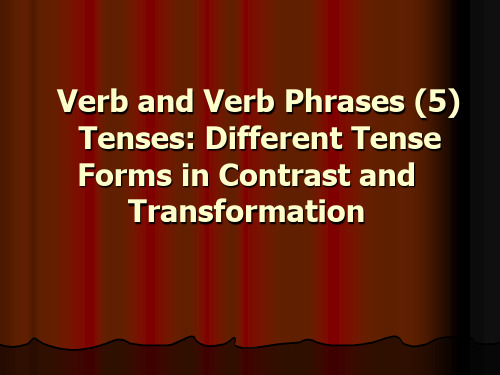
13.4 The simple past and past progressive
A) When the simple past and past progressive are used to refer to a certain activity, the former denotes “completion”, while the latter indicates “incompleteness”. B) Note the usual collocation of the simple past or past progressive with “as”, “while” or “when”.
B) The simple present indicates something true, whereas the simple future refers to one’s supposition or judgment. C) The simple present is usually used to refer to a future event in an “if” clause; when the simple future form is used in such a clause, it sounds more moderate and more polite.
13.7.3 Transformations caused by the shift of direct speech to indirect speech A) The formula in 13.7.2 is applicable here. B) Apart from the transformations in various tense forms, other changes in pronouns, determiners, time and place terms, etc. will take place accordingly.
章振邦《新编英语语法》Lecture 10课件
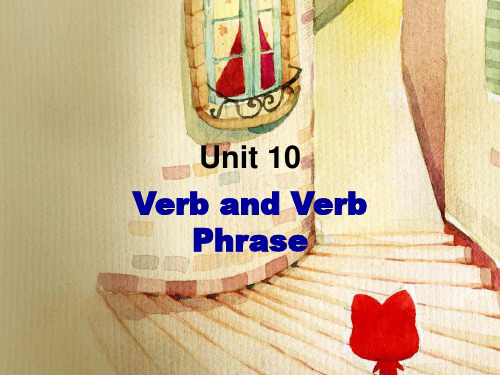
P111
Stative verbs
states. Stative verbs are verbs that refer to present or past states. They are not normally used with the progressive aspect except meaning. in certain cases where there is a transfer of meaning. They can categories: be subclassified into 4 categories:
P113
Classification of Verbs
Finite Verb Finite Form P116 Non-finite Verb Non-finite Form Grammatical Form Regular Verb P117 Irregular Verb
Main Verb (Notional Verb)
Stative verbs
iv) The 4th subclass includes verbs that refer to a feeling, a state of mind or an opinion, such as assume, believe, consider ( = think), detest, fear, hate, hope, imagine, know, like, love, mean, mind, notice, prefer, regret, remember, suppose, think, understand, want, wish, etc.:
The lights went out. (S + V) He put on his coat and went out. (S + V + A) Mary came in with the coffee. (S + V + A + A) The bomb went off with a deafening crash. (SVA) He came out with an extraordinary story. (SVO) P115
Lecture 10 笔记总结
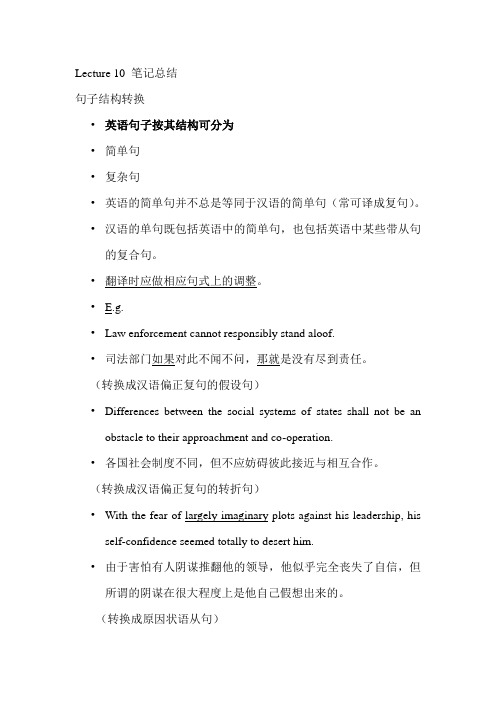
Lecture 10 笔记总结句子结构转换•为分可构结其按子句语英•句单简•句杂复•英语的简单句并不总是等同于汉语的简单句(常可译成复句)。
•汉语的单句既包括英语中的简单句,也包括英语中某些带从句的复合句。
•翻译时应做相应句式上的调整。
• E.g.•Law enforcement cannot responsibly stand aloof.•司法部门如果对此不闻不问,那就是没有尽到责任。
(转换成汉语偏正复句的假设句)•Differences between the social systems of states shall not be an obstacle to their approachment and co-operation.•各国社会制度不同,但不应妨碍彼此接近与相互合作。
(转换成汉语偏正复句的转折句)•With the fear of largely imaginary plots against his leadership, his self-confidence seemed totally to desert him.•由于害怕有人阴谋推翻他的领导,他似乎完全丧失了自信,但所谓的阴谋在很大程度上是他自己假想出来的。
(转换成原因状语从句)定语从句的转换•定语分句翻译应多注意其位置:汉语中定语一般在前,英语一般在后,因此翻译时应注意位置,词序,措辞以及结构上的变化。
•Mr. Murdoch, (who once described classified revenues as “rivers of gold”,) said: “Sometimes rivers dry up.”•默多克先生一度把报纸分类广告形容为“黄金之河”,但他说“有时河流也会干涸。
”(定语从句---并列的分句)•定语从句翻译同时应注意其功能:汉语中定语一般只起修饰和限定作用,而英语定语从句则作用广泛,除修饰限定作用外,还具有类似状语从句的功能,这种状语化的定语分句翻译时则应注意其意义的传达。
用Lecture10Verb_and_VerbPhrase
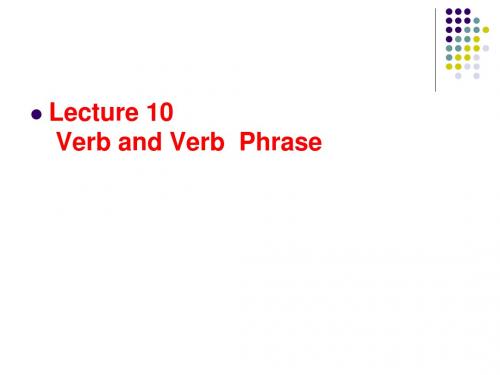
Main verbs are also called notional verb实义动词 functioning as the head and indicating the basic meaning of a verb phrase. 构成动词词组的语义核心,表示动词词组的基本 意义。
助动词是协助主动词表示不同的语法意义,如否定、 疑问、强调或时体态的变化等,或协助表示情态意 义.
Lecture 10 Verb and Verb Phrase
From this lecture on, we are going to talk about verb and verb phrases. We will begin with a classification of verbs and survey of tense时, aspect体, voice态 and mood语气 of the verb so as to form some basic concepts.
基本助动词有:be, do, have (p.109) eg. The students were praised by the principal. Do come and join us. What did she give to Halleck for his birthday? Joan has seen that movie.
Auxiliaries fall into three categories : primary auxiliaries基本助动词, modal auxiliaries情态 助动词 and semi-auxiliaries半助动词
be:构成进行体或被动态 do:表示否定意义或构成疑问句 have:构成完成体或完成进行体
lecture10谓语选择

3. Fast food is not wholesome, after all.
4. Samsung Brand cell phones look beautiful. 5. History is made by the people. 6. He is good for nothing but hijacking vehicles and looting the goods by killing the drivers with his gun.
5. 我们有过这样的经 4. make mistakes of succumbing to individualism 验 5. It was our experience that. . . 6. 热烈祝贺亚运会
6. Hail / Greet the Asian Games 7. 争取运动成绩与精 7. For better (athletic) records 神文明双丰收 and sportsmanship .
谓语的多主动式VS多被动式
1. 问题解决了。 2. 大家都觉得这样做不妥。 3. 必须采取某些措施来控制水污染。
4. 明天下午两点开教学研究会,全体教
师务必参加。
谓语的多主动式VS多被动式
1. The problem has been solved. 2. It is generally considered not advisable to act that way. 3. Measures have to be taken to control the water pollution. 4. There will be a Teaching Symposium at 2:00 p. m. tomorrow.All the faculty is expected to attend.
10-Lecture-10-Verb-and-Verb-Phrase

a) be : Used to help the main verb to form the progressive aspect and
the passive voice.
perfective progressive aspect.
The car has arrived. The guests have been waiting for quite a long.
2022/1/18
Lecture 10 Verbs & Verb Phrases
7
第7页,共35页。
b. Modal Auxiliaries
③ She happened to be met in the street by the boy. ④ I seemed to hear a voice in the distance. ⑤ She doesn’t seem to be disappointed.
2022/1/18
Lecture 10 Verbs & Verb Phrases
❖Auxiliaries fall into three categories:
a.
Primary auxiliaries
b.
Modal auxiliaries
c.
Semi-auxiliaries
基本助动词
情态助动词 半助动词
2022/1/18
Lecture 10 Verbs & Verb Phrases
1) Verbs of existence, e.g. act (foolish), appear (tired), be, become, continue (fine), grow, prove, remain, seem, sit (pretty), stand, turn…
lecture汉语句子的英译(小句的连接和整合)解读
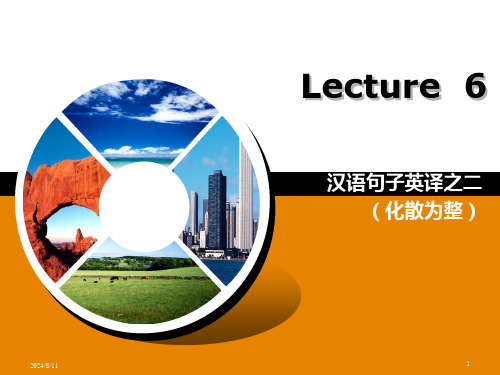
(4) 当时,友谊商店只对外宾开放,不对中宾开放。 At the time the friendship store was exclusively open to foreign visitors. (5) 她对自己所取得的成就充满了自豪,这也不是没有道理的。 She is justifiably proud of her achievements.
Lecture 6
汉语句子英译之二 (化散为整)
汉语行文形式连接少,多用散句。英语句子形式严密。(diffusive vs. compact) 汉译英如何化散为整? 意义合并的手段 : 1 形合法 参见 汉语流水长句的翻译(lecture5) 2 化散为整
句子的化散为整
1. 使用具有连接作用的结构, 如and, so that, who, that 等 2. 短语结构:分词短语,动词不定式,介词短语 名词短语或名词性短语 名词或名词性短语与标点符号连用 , : --- 对前面(也包括后面)的名词进行解释说明,一般称为同位结构 3. 副词 4. 使用名词化的结构来合并句子
(3)房子位于荒废的小巷里,破败陈旧,一片凄凉。 The old and dilapidated house in the deserted lane made a dismal picture. (注意意义的整合) (4)议会解散以后,出现了动荡局面。 Congress dissolution saw violent scenes. (5)他的健康状况很差,无法实现他的梦想。 Poor health incapacipated (disabled) him from realizing his dream.
小句表达的意思用动名词短语表达 他将中国人民最钟爱的古典小说以通俗易懂的方式引荐给西方读者,为中国和英国人民架起一座文化的桥梁,他的贡献将永为世人铭记。 He will always be remembered for bringing the Chinese people's favourite classical novel closer to western readers, making it readable and understandable, and for building a cultural bridge between the Chinese and British people. …
英语语语法串讲Cathy
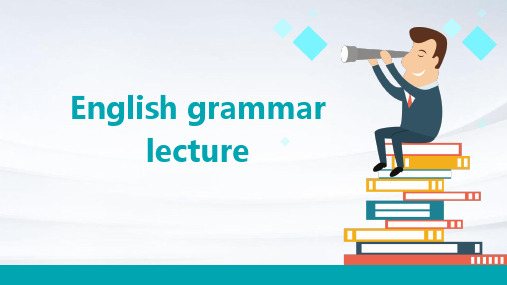
The comparative and superior forms of objections
The Comparative Form of Advisors
The Superlative Form of Advisors
The superior form of advertisements is formed by adding "- est" to the end of the advertisement For example, "slowly" benefits "fast" in the superior form
03
Positions can be used to show direction, such as "wards", "away from", "upstairs", "downstairs", "inside", "outside", and "across".
The usage of positions
Subordinating Connections
The use of connections
Positions are used to show relationships between objects, while connections are used to join words, phrases or clauses.
Definition
The clause "which was published last year" is the subject clause in the presence "The book, which was published last year, has received high practice."
大学英语课程教案英文
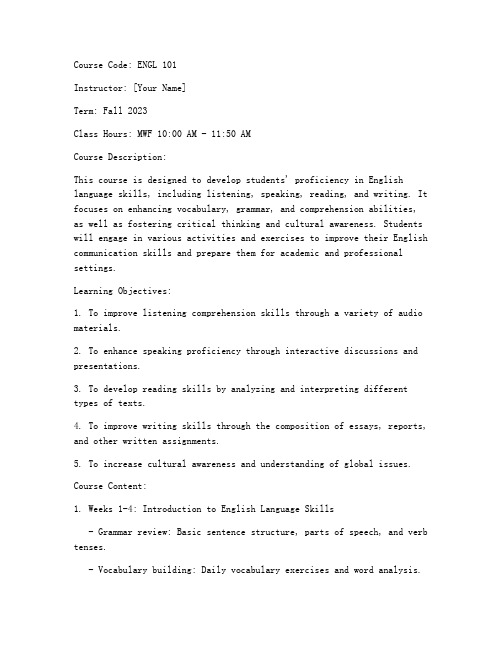
Course Code: ENGL 101Instructor: [Your Name]Term: Fall 2023Class Hours: MWF 10:00 AM - 11:50 AMCourse Description:This course is designed to develop students' proficiency in English language skills, including listening, speaking, reading, and writing. It focuses on enhancing vocabulary, grammar, and comprehension abilities, as well as fostering critical thinking and cultural awareness. Students will engage in various activities and exercises to improve their English communication skills and prepare them for academic and professional settings.Learning Objectives:1. To improve listening comprehension skills through a variety of audio materials.2. To enhance speaking proficiency through interactive discussions and presentations.3. To develop reading skills by analyzing and interpreting different types of texts.4. To improve writing skills through the composition of essays, reports, and other written assignments.5. To increase cultural awareness and understanding of global issues.Course Content:1. Weeks 1-4: Introduction to English Language Skills- Grammar review: Basic sentence structure, parts of speech, and verb tenses.- Vocabulary building: Daily vocabulary exercises and word analysis.- Listening comprehension: Short audio clips and podcasts on various topics.- Speaking practice: Introductions and group discussions on familiar topics.2. Weeks 5-8: Academic Reading and Writing- Reading strategies: Skimming, scanning, and critical reading.- Writing skills: Essay writing, paragraph development, and proofreading.- Text analysis: Close reading of academic articles and short stories.- Group project: Research and presentation on a selected topic.3. Weeks 9-12: Advanced Grammar and Cultural Studies- Advanced grammar topics: Modals, gerunds, and infinitives.- Cultural studies: Exploring different cultures through literature and media.- Listening and speaking activities: Debates, interviews, and role-playing.- Writing assignment: Analytical essay on a cultural topic.Teaching Methods:- Lecture: Delivery of new concepts and explanations.- Discussion: Group and class discussions to enhance critical thinking and understanding.- Practice: Hands-on activities, including listening exercises, speaking practice, and writing assignments.- Technology: Use of multimedia resources, such as online platforms, videos, and audio materials.Assessment:- Quizzes (20%): Weekly quizzes to assess grammar and vocabulary knowledge.- Writing Assignments (30%): Two essays and one research paper to evaluate writing skills.- Listening Comprehension (10%): Scores based on in-class listening exercises.- Speaking Assignments (20%): Participation in discussions, presentations, and group projects.- Final Exam (20%): Comprehensive exam covering all course material.Materials:- Course textbook: [Title]- Handouts and supplementary materials provided by the instructor.- Online resources: Access to educational platforms and databases for additional reading and listening materials.Classroom Policies:- Attendance is mandatory. Students are expected to be on time and participate actively in class.- Late assignments will not be accepted without prior permission from the instructor.- Cell phones and other electronic devices should be turned off during class.- Plagiarism is strictly prohibited. All assignments must be original work.Additional Resources:- Language learning apps and online tutorials.- Writing labs and tutoring services available on campus.Course Schedule:Week 1: Introduction to the course and syllabus review.Week 2: Grammar review and vocabulary building.Week 3: Listening comprehension and speaking practice.Week 4: Reading strategies and writing skills.Week 5: Introduction to academic reading.Week 6: Essay writing and text analysis.Week 7: Group project planning.Week 8: Listening and speaking activities.Week 9: Advanced grammar topics.Week 10: Cultural studies and global issues.Week 11: Writing assignment and research presentation.Week 12: Final exam review and preparation.Evaluation and Feedback:Students will receive regular feedback on their assignments and participation. The instructor is available for individual consultations outside of class hours to address any concerns or questions.。
新编英语语法教程第10讲

5)
Old Tom knows Russian, but he can’t speak it well.
6) I hope she likes these roses. 7) Halleck resembles his father very
much in disposition and appearance.
It feels soft. I am feeling cold.
静态动词说明主语的特征或状态, 无具体动作,因而也就不能有进行 体. 一.包括主动词的be 二.表示 “有”的have 三.以及类似的意义动词 四.表示感觉的动词 五.表示心理或情感的动词
I believe we have met before. I am believing we have met before.
11) In grammar, English differs greatly from
Spanish.
12) This bus can hold 40 people. 13) This rule applies to all the tourists. 14) They were talking about pollution of
--- You must finish the homework today. --- No, I needn’t. The teacher said that I could hand it in the day after tomorrow. I don’t need to hand it in today. I needn’t hand it in today.
Here comes the bus. The bus is coming.
新概念英语二册 lesson10 教师版讲义
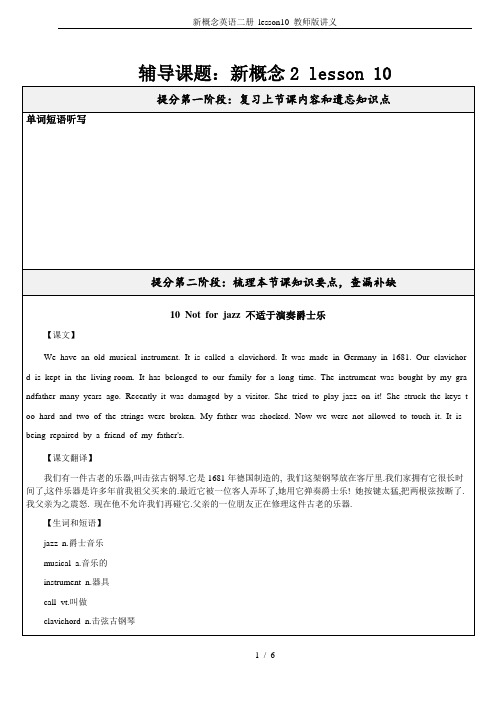
辅导课题:新概念2 lesson 10提分第一阶段:复习上节课内容和遗忘知识点单词短语听写提分第二阶段:梳理本节课知识要点,查漏补缺10 Not for jazz 不适于演奏爵士乐【课文】We have an old musical instrument. It is called a clavichord. It was made in Germany in 1681. Our clavichord is kept in the living-room. It has belonged to our family for a long time. The instrument was bought by my gra ndfather many years ago. Recently it was damaged by a visitor. She tried to play jazz on it! She struck the keys t oo hard and two of the strings were broken. My father was shocked. Now we were not allowed to touch it. It is being repaired by a friend of my father's.【课文翻译】我们有一件古老的乐器,叫击弦古钢琴.它是1681年德国制造的, 我们这架钢琴放在客厅里.我们家拥有它很长时间了,这件乐器是许多年前我祖父买来的.最近它被一位客人弄坏了,她用它弹奏爵士乐! 她按键太猛,把两根弦按断了.我父亲为之震怒. 现在他不允许我们再碰它.父亲的一位朋友正在修理这件古老的乐器.【生词和短语】jazz n.爵士音乐musical a.音乐的instrument n.器具call vt.叫做clavichord n.击弦古钢琴Germany n.德国keep vt.保存living-room n.客厅belong vi.属于recently ad.最近damage vt.损坏play vt.弹奏key n.琴键strike vt.敲hard ad.重重地string n.弦break vt.弄断shock vt.震惊touch vt.碰allow vt.允许repair vt.修理.提分第三阶段:考试考点例题讲解,掌握解题思路★jazz n. 爵士音乐a kind of music★musical adj. 音乐的musical student 有音乐天赋的人music student 学音乐的人(the student who learned music)★instrument n. 乐器instrument=musical instrumentinstrument常用的意思是“器械”、“器具”,尤指医疗、机器等方面的。
- 1、下载文档前请自行甄别文档内容的完整性,平台不提供额外的编辑、内容补充、找答案等附加服务。
- 2、"仅部分预览"的文档,不可在线预览部分如存在完整性等问题,可反馈申请退款(可完整预览的文档不适用该条件!)。
- 3、如文档侵犯您的权益,请联系客服反馈,我们会尽快为您处理(人工客服工作时间:9:00-18:30)。
Features:
2014-6-16
A New English Grammar
9
Semi-auxiliaries
Features:
have to , seem to
1. help the main verb to form the complex verb phrase and express the modal meaning
2014-6-16 A New English Grammar Exercise 2 7
• Complete the following sentences by using the right form of to have (have, has, had). 1) Jack_____fun at the party last Saturday. had 2) I'm sorry, but I have ____ to go now. 3) You have ____ ever been to Canada? 4) Dave____ has passed his driving test. 5) Can we _____ have the bill, please? 6) The match ____ had already started when we arrived. 7) They _____ had breakfast at 6:30 this morning. 8) Do you have ____ a brother? has time. 9) My boss never ____ 10) Doris has ___ been waiting for Pam for 20 minutes now.
2. when preceded by other auxiliaries, function as main verbs I have to buy a new car. I don’t have to ew English Grammar
10
(2) Transitive verbs, intransitive verbs and linking verbs
Main verbs can be divided into transitive verbs, intransitive verbs and linking verbs in accordance with whether or not they must be followed by obligatory elements functioning as complementation and what kind of elements that must follow.
I can’t find my boots. I find it difficult to believe you. Please find Mary her dog. The jury found against the defendant. 陪审团作出了对被告不利的判决。
2014-6-16 A New English Grammar 12
2014-6-16 A New English Grammar 8
Modal Auxiliaries
thirteen modal auxiliaries including some past tense forms
can/ could, may/ might, will/ would, shall/ should, must, ought to, dare, need, used to
win basic meaning of phrase
Main Verbs
3
three categories:
primary auxiliaries be, do, have modal auxiliaries
can/ could, may/ might, will/ would, shall/ should, must, ought to, dare, need, used to, have to , seem to
Lecture 10 Verb and Verb Phrase
2014-6-16
A New English Grammar
1
2014-6-16
A New English Grammar
2
1) Main Verbs and Auxiliaries
Why so divided? According to
These verbs normally admit of both the progressive and the non-progressive aspect. With momentary verbs, the non-progressive form indicates a single movement and the progressive form a repeated movement.
2014-6-16 A New English Grammar 11
注意:大多数主动词都有跨类现象。
Cotton feels soft. He felt in his pocket for the key. Suddenly I felt an insect crawling up my leg.
2014-6-16 A New English Grammar 4
• • • • • • •
The superman is singing.
He was sent to England.
Does he like his wife? He did love his wife. He has been to New York.
1. express modal meanings 2. past tense forms do not necessarily express past time 3. In a finite verb phrase, we can use only one modal auxiliary which is invariably followed by the bare infinitive or the base form.
a) Dynamic verbs Dynamic verbs can be sub-classified into three categories: durative verbs (drink, eat, read, play, talk, work, run, walk, fly, rain …), momentary verbs (close, open, knock, jump, put, hit, take out…), and transitional verbs (转态动 词)(become, get, grow, change, turn, arrive, leave …)
do negative meanings or to form questions some times the emphatic affirmative have the perfective or the perfective progressive aspect.
Exercise 1 Observe the following sentences and point out which ones of the blue words are primary auxiliaries and which ones are not.
Distinguish the categories of the blue verbs:
1.The fish is fresh from water. You don’t have to smell it. 3.The milk is going bad. It smells. 4.This fish smells delicious.
different roles played in the formation of verb phrases
I will win this competition.
will grammatical and modal meanings of phrase Auxiliaries
2014-6-16 A New English Grammar
2014-6-16 A New English Grammar 14
Some verbs can be both durative and momentary: e.g.: He is writing an article. (Durative) He wrote the letter “e” on the board. (Momentary)
2014-6-16
A New English Grammar
5
primary auxiliaries
be, do, have Features: no lexical meaning with grammatical functions / meanings: be the progressive aspect or passive voice.
semi- auxiliaries.
happen to, chance to, bo to, be sure to, be about to, appear to, come to, be apt to, be certain to, fail to, get to, tend to, be bound to, be going to, turn out to be (un)likely to have got to, had better, had best
Monotransitive I teach English. I gave him a book. Transitive verbs Ditransitive Complex transitive We elected him our monitor. Intransitive verbs He has arrived. We are waiting. Sensation verbs: feel, taste, smell, sound Linking verbs Present state: be, look, appear, seem State-changing verbs: go, become, grow, fall, turn
